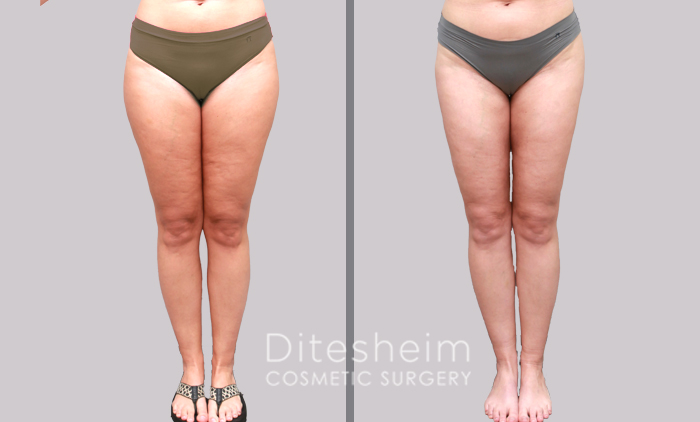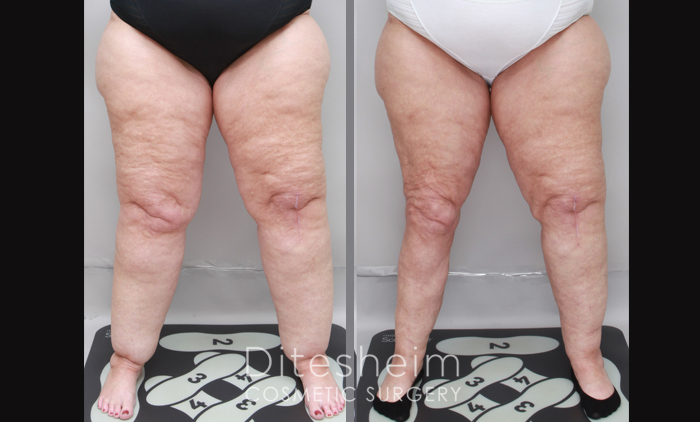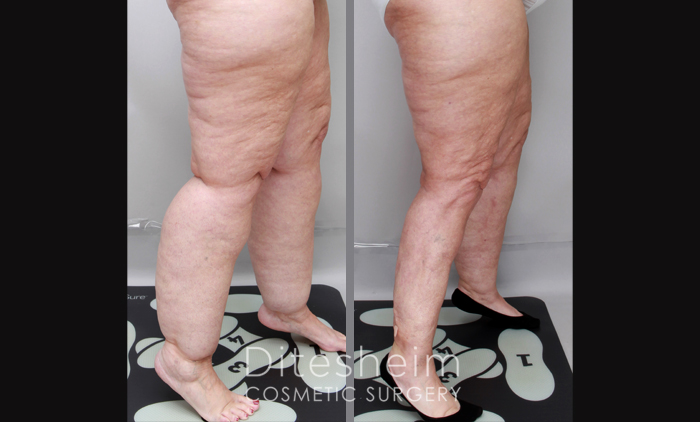- Plastic Surgery
- Liposuction
- MedSpa
- Patients Gallery
- Our Practice
- Resources
- Contact


Water-jet liposuction can really make a life-changing difference for women suffering from lipedema. Often mis-diagnosed or not recognized as a real disease, lipedema is characterized as abnormal, out-of-proportion fat deposits most commonly on the thighs and legs of women. The areas are usually painful to touch and often cause easy bruising of the overlying skin. Arms can also be affected, and the torso less commonly. Unlike lymphedema, which is an abnormal swelling of the lower extremities from lymphatic dysfunction, lipedema is very different.
There are no medications or injections to treat lipedema. Fortunately, liposuction to remove the excess fatty tissue can be a very real solution. Liposuction permanently removes the lipedema fat, reducing pain, increasing mobility and daily function. Even better: water-jet liposuction, which works by dislodging and aspirating lipedema fat, is effective but gentle on the surrounding tissues. No heat is used, so there is no risk of skin loss. Studies from Germany (Dr. Stutz) have shown the unusual benefit of using water-jet liposuction as it removes fat and does not injure the lymphatics.
Before a lipedema surgery in Charlotte, the deep veins of the lower body are tested with Duplex technology to assure that the veins needed to manage swelling are intact. All other health concerns like diabetes or other medical conditions are assessed to prepare for a safe surgical experience.
Since lipedema could be accompanied by vein diseases, and this body sculpting operation considers an individuals’ unique proportions, the first step is to set up a consultation. Arrange a lipedema surgery assessment with Dr. Ditesheim to discuss the possible benefits and best approach for this procedure. We are the leaders in Charlotte for lipedema liposuction. See some more pictures of what Dr. Ditesheim has done in our lipedema gallery.

Causes and Symptoms of Lipedema
A condition affecting more women than men, lipedema is a disease resulting in inflamed fat cells on the lower body that may cause abnormal sensations and even pain. The most significant side effect of lipedema is excess fat accumulation on the lower body, typically affecting the calves, thighs, and buttocks, excluding the feet or hands. In fewer instances, lipedema could also cause swelling and excess fat accumulation in the upper arms.
Individuals with lipedema typically appear bottom-heavy with smaller upper bodies than lower bodies, making their figures appear disproportional. Subsequently, many individuals with lipedema discover that it has a negative impact on their emotional and mental well-being. For instance, the condition’s impact on a person’s figure and ability to walk may be a significant source of emotional distress.
Though the exact cause of lipedema is typically unknown, the condition could be due to genetics, as it often affects several women in a family. In addition, the condition could result from significant hormone fluctuations that occur during pregnancy, menopause, and puberty. This condition does not occur due to obesity although lipedema may be manageable with diet and exercise, and most patients are overweight due to the symptoms.

Surgery for Managing Lipedema Symptoms
Lipedema surgery in Charlotte primarily relies on liposuction to extract extra fat cells from the lower body, typically up to 11 pounds during one treatment session. Since liposuction entirely removes the inflamed fat cells from treatment areas, it is often the most effective treatment for managing extra lower body fat and other lipedema symptoms. However, for lipedema patients with more significant amounts of fat accumulation, several liposuction treatments may be necessary to relieve symptoms adequately.
During lipedema liposuction surgery, Dr. Ditesheim makes small incisions in the affected areas to allow a cannula tube to go beneath the skin and target excess, inflamed fat cells. The cannula liquefies the fat cells and vacuums it away from the body without damaging nearby veins and lymphatic system structures. Typically, the incisions necessary for lipedema surgery are minor and will heal independently like standard liposuction incisions.
In some cases, lipedema surgery may include surgical excision of loose skin that may form due to fat removal and poor skin elasticity. However, patients will have a longer recovery and more noticeable scarring after surgery if this step is necessary to enhance the lower body contours.

Discuss the Possibilities of Lipedema Surgery in Charlotte
Gaining weight on your thighs, calves, and buttocks is a common experience for many women, especially during periods of considerable hormone fluctuations. However, some women develop significantly abnormal fat accumulation in these areas, often accompanied by swelling, discomfort, and impaired mobility, diagnosed as lipedema. When the condition’s symptoms are too severe for at-home management, the next step is to visit our lipedema surgery center in Charlotte.
Our lipedema surgical solutions use liposuction techniques to remove excess fat buildup from the lower body while surgically removing loose skin tissue if necessary. However, since the surgical approach is highly individualized and symptoms of lipedema can vary between patients, a consultation is required ahead of time. Schedule a consultation with the medical team at Ditesheim Cosmetic Surgery to discuss your symptoms, medical history, and possible treatment approach with licensed lipedema liposuction surgeon Dr. Ditesheim.
Helping Lipedema Patients: FAQ
Does Dr. Ditesheim have experience treating different stages of lipedema patients?
Yes, on our website there is a page dedicated to Lipedema before and after photos including the patient stage and amount of fat removed: https://empowermd.com/before-after-gallery/body/lipedema/
What are Dr. Ditesheim’s credentials, is he board-certified?
Dr. Ditesheim is a certified by the American Board of Plastic Surgery and a fellow of the American College of Surgeons. He trained in general and plastic surgery at Vanderbilt, Wake Forest and Harvard Universities. He has been in private practice for 28 years. His office is in Charlotte, NC. His speciality is body contouring plastic surgery, and has performed several thousand body contouring and liposuction procedures. He is passionate about helping to restore confidence and integrity for people struggling with lipedema. Though surgical treatment is not curative, removing lipedema tissue can change lives.
Can I arrange a virtual consultation as I live far from Charlotte?
Yes, Tammy, our patient coordinator will be glad to set up a virtual consultation on TouchMD, an app that lets us communicate confidentially. [email protected]
What is the charge for the consultation?
In office or virtual consultations are $250, confirmed with a credit card. Prior to the consultation you will be able to upload photos of the problem lipedema areas and any pertinent medical information. Dr. Ditesheim will meet with you personally and will want to understand your motivations, functional limitations and priority of areas to treat. At the close of the consultation, you will make a plan together for treatment. All cost information and arrangements for surgery will be discussed in detail.
Where is the surgery performed?
All surgical procedures are performed at our on-site surgical facility, Blakeney Surgical Center, Charlotte, NC. This is a AAAASF accredited surgical facility for general anesthesia. If you are coming from out of town, you are encouraged to stay in Charlotte overnight with an adult caretaker.
Do you offer local awake lipedema surgery?
Yes. With Water liposuction, patients have the option of staying awake and treating one area under local (tumescent) anesthesia. The limitations of awake liposuction are that you may find the surgery too uncomfortable, may be too anxious or want more fatty tissue removed. There is a limit how much fatty lipedema tissue can be removed with local anesthesia, usually 3-4lb. This is compared with 10-15lb with general anesthesia.
What areas do you treat first?
Our strategy is to safely remove as much fatty lipedema tissue in one surgical procedure. Each patient can determine which areas to prioritize. Dr. Ditesheim will be interested in knowing what areas are most painful or bruise easily, if there is functional limitation with walking or stairs and if there are difficulties with dressing (wearing shirts or pants or shoes).
How much fatty lipedema tissue can be removed?
For most healthy patients with a normal blood count (hemoglobin: 14-16), a total of 10lb of fatty tissue can be removed in one procedure. Occasionally more fatty tissue will be removed, up to 15-20lb. Patients with more risk factors or a lower blood count (hemoglobin 10-14) tolerate less fatty tissue removed safely (6-10lb). Awake local anesthesia will remove less fatty tissue: 3-4lb. The determination of how much fatty tissue can be removed safely will be individualized. On the gallery, you can see how much was removed for different patients (https://empowermd.com/before-after-gallery/body/lipedema/).
What liposuction technique do you prefer for lipedema treatment?
Dr. Ditesheim preferentially use Water liposuction (also Water-jet liposuction, Aquashape, Body-jet) as the pulsed water jet is very effective in removing the lipedema fatty tissue. Two advantages of Water Liposuction: 1. Because no heat energy is used, water liposuction is “gentler” on the surrounding tissues. 2. The water-jet, by continuously infusing adrenaline throughout the procedure, minimizes blood loss, permitting a greater amount of fatty tissue to be removed. We do use Vaser (ultrasonic) and Power (vibratory) liposuction for body contouring procedures, but prefer Water Liposuction for lipedema treatment.
Do you accept insurance for lipedema surgical treatment?
We will support patients in their efforts to obtain insurance reimbursement, as this is a restorative, reconstructive procedure for most all patients. Our office will not file insurance, as all fees are patient responsible. We will be glad to write supporting medical documentation to facilitate insurance reimbursement. We do not have a participating contract with any insurance company.
Does it cost more to treat multiple areas, say arms and legs?
No. The procedure is “Debulking or removal of lipedema tissue from upper or lower extremities”. This is different from “liposuction of arms or thighs or legs”. The goal is to safely and efficiently remove lipedema tissue from the upper and/or lower extremities. If a patient wants to treat arms and legs in one setting there is not an additional fee. The total amount of fatty tissue removed is determined pre-op. If not all the fat can be removed from an area at one time, a second procedure may be needed and will incur additional costs. ( in the lipedema gallery there are examples of patients with Stage 3 lipedema who had more treatment for one leg than the other at the first session). https://empowermd.com/before-after-gallery/body/lipedema/


 (704) 542-8686
(704) 542-8686